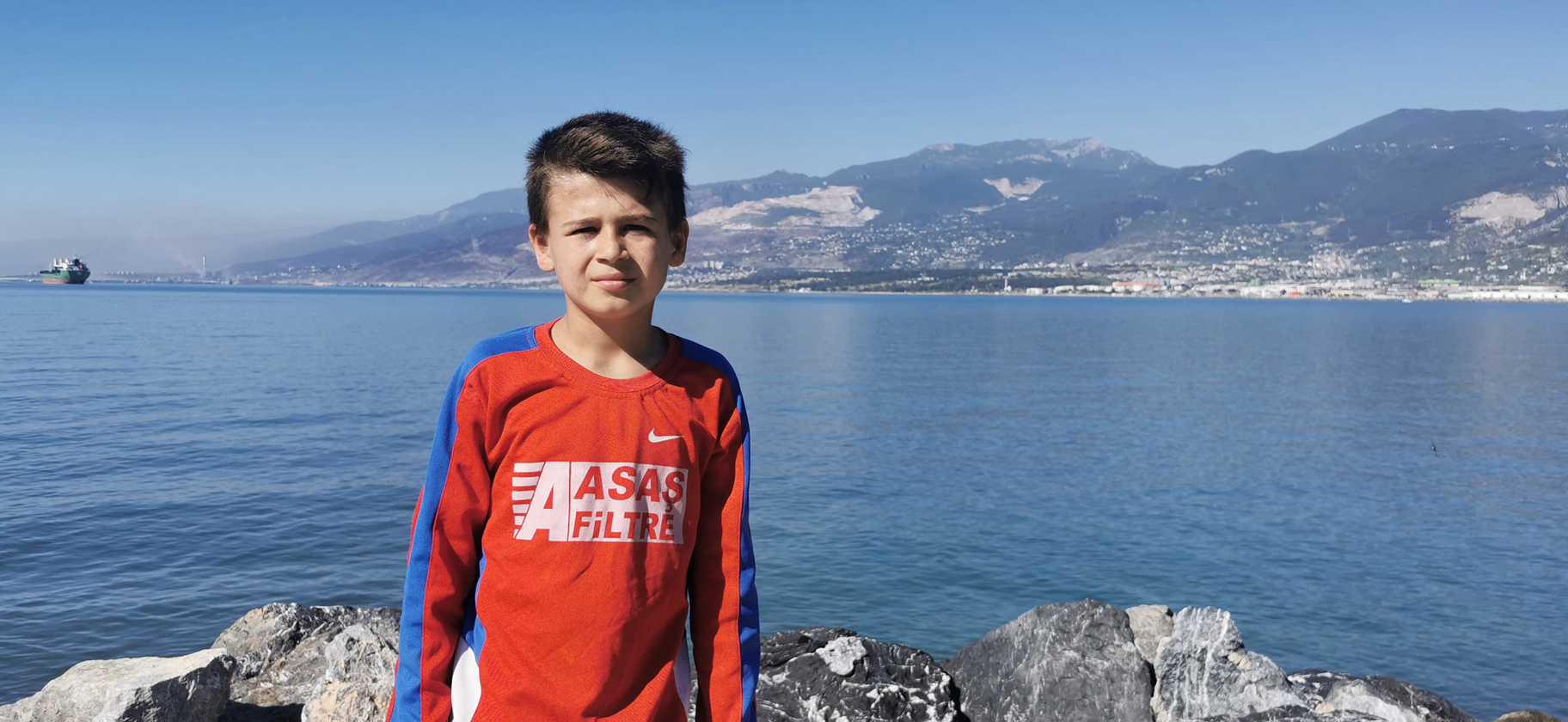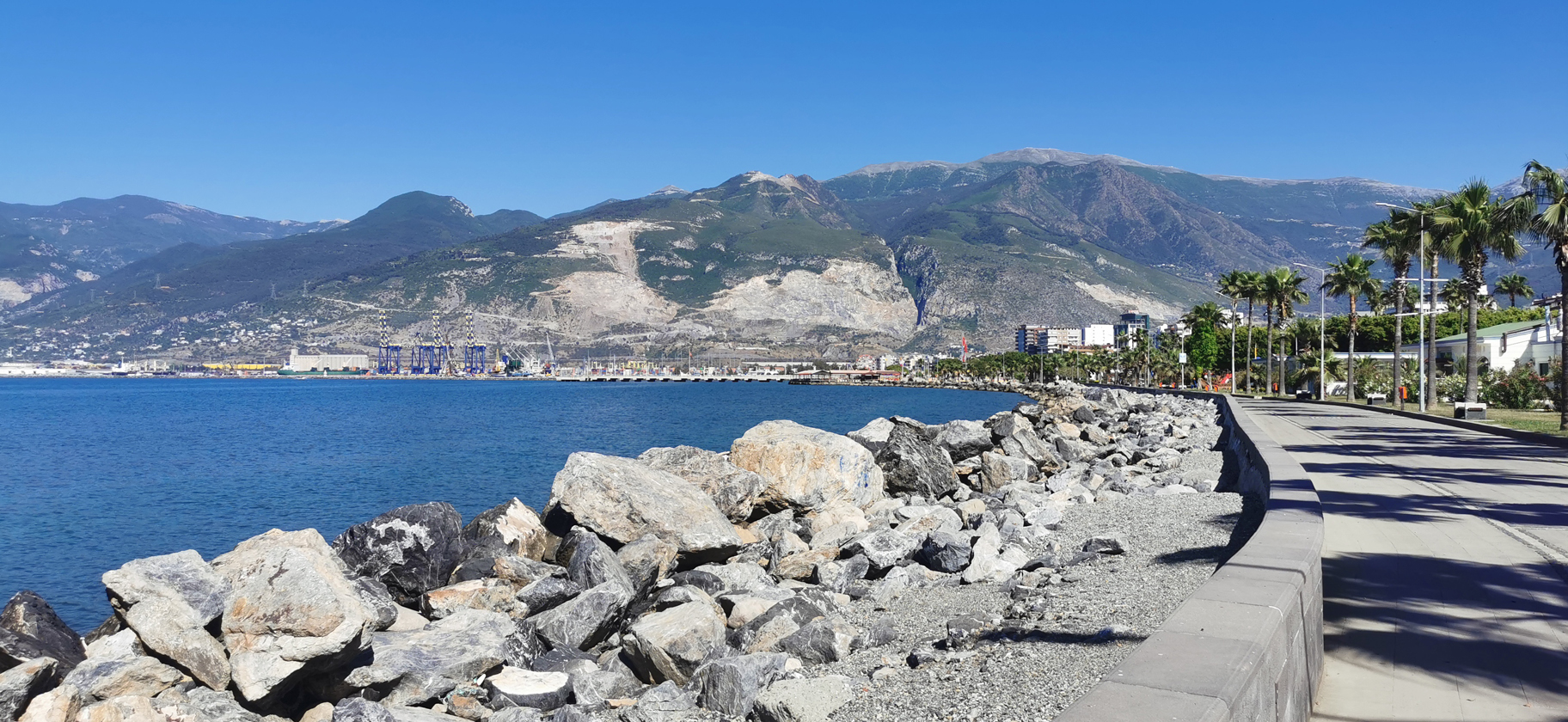The Fisher Boy

Dark particulate matter spewing from the Payas refinery clung to the moisture in the air creating a haze that threatened to choke Iskenderun’s empty waterfront. The suffocating carbons of heavy industry made it difficult to breathe and trying to enjoy a stroll in the spring sun from behind a mask was impossible. In the city, offices and shops were closed. Only the local BIM and a few döner joints remained open so that people could still get a bite to eat. The pier overlooking the port of the old Hatay Republic on the western edge of the Aleppo plain had been eerily silent for days with Turks, asked by the powers that be, to confine themselves to their homes until the end of Ramadan, to avoid contact, and reduce cases and hospitalizations.
Jemel sped along on his rusty old bicycle hopping the train tracks that ran through the harbour. Cutting through the side streets and alleyways by the seaside, through the abandoned Luna Park, Jemel repeated his singsong, salaam aleikum, aleikum salaam, before abandoning his ride to watch it roll and crash clumsily into the statues that stood watch over the pier.
There was a freedom here in Turkey that Jemel’s nine-year-old self would not understand for years to come. Turkey was not his home and the rules did not apply. He was an Arab from the far side of the tunnels that cut through the eastern mountains to a land where hope had been abandoned. There was no one out giving alms and his mother could no longer get by on begging. She would need to get a job, but there were no jobs. He was too young to know of work, but his belly could still know hunger. For now, his belly was full and there was a joy to be found in an empty city and in the hunt for the next meal. His baptism had come when the government dropped bombs on his neighbourhood and that tore Mohammed’s face off. No microscopic terror could frighten him. Violence needed to be seen and his oppressor had a face.
Jemel ran out to the end of the pier hopping onto both sides of the railing along the way to the far end to look into the water below. Clusters of sardines and small mackerel conditioned to swim in circles by the pier awaited crumbs from weekenders and happy families out for a midday stroll. It was a meal that would never come. Deprived of a meal, those small fish were themselves a meal and catching them was half the fun.
After making note of his options on either side of the pier, Jemel ran back over to the square and began to inspect the trash cans. Raising himself up onto the rim, his whole top half would disappear into the bin. Eventually, he emerged with a pair of rusty old beer cans. Using a shard of glass, he sliced through the beer cans and lopped off their tops.
Small waves lapped up along the dyke as Jemel walked along the shoreline collecting stones and watching for sparkles and trails of small bubbles rising up through the water. Occasionally, he would roll up his pantlegs and step into the water up to his knees and balance perilously on the slippery rocks submerged underwater. Reaching into the sea, Jemel pulled up a thin filament he could see reflecting in the sunlight. He pulled softly on the lead drawing it out of the water gently so as preserve the full length of the string. He could not afford for it to snap and lose the line. He followed the line through the rocks to where it attached to its buoy – the top half of an old plastic coke bottle. Jemel grabbed the buoy and unspooled the line. He tugged gently on the string and followed it to the other end that was lying in the sand at the bottom of a small pool of seawater. Attached to it was a rusty old hook. He blew on it, cleaned it of excess seaweed, and examined it to make sure that it could do the job.
Satisfied with the condition of his equipment, Jemel scanned over the rocks deeper into the water. There were few seagulls, his competitors, flying about today so Jemel liked his chances. The gulls don’t like the soot and the smoke that erupts from the refinery and had decided to migrate to shores where the sky overhead was clear. Jemel had been honing his skills all through the silent winter and his aim was perfect. Noticing a small dark patch clinging to one of the rocks, he threw one of his stones into the water. A small trail of bubbles rose to the surface through the centre of the ripples formed by the small splash. Rolling up his pantlegs again, he waded into the water over to the rock and pulled out a mollusc.
Jemel wandered into the park with his shell and grabbed one of the bricks that lay beside the winding paths that mark the fringes of the gardens where the oleander and bougainvillea grow. The mollusc would not give up without a fight and it took Jemel a few hard whacks before he could finally crack through its shell. He had his line, he had a rusty old hook, and now he had his bait.
Balancing himself on the railing of the pier Jemel wrapped the line between his thumb and middle finger and used his index finger to pull the string up and down so that it bobbed on the surface of the water. Within a matter of seconds, he had a bite and pulled up a small fish the size of his thumb. Bending down onto the slats of the pier he drew out another of the stones he had collected and used it to cut off a piece of the fish’s tail. He put the fish into one of his beer cans and affixed the piece of tail to the hook. Repeating this process, within a matter of minutes Jemel had amassed a collection of half a dozen fish.
Stray cats spend their days lazing in the shade of the trees along the promenade. They wait on the kindness of strangers and shop owners who leave small morsels of food, but the minute a single fish is pulled from the water they know and come running. Jemel was now doing double-duty fishing while fending off the cats who were keen to take their share. The cats meowed and clawed at his pant leg but Jemel was not ready to surrender a single morsel of his well-earned catch.
Grabbing his beer cans, Jemel took his bounty and walked back over to the statue in the main square where he had left his bicycle. The cats followed him. He sat down in the shade of the statue and inspected his catch. Grabbing the smallest from the pack, Jemel held the kitten in his arms and pulled a fish from his can. He hissed at the other cats who became impatient and reminded them to sit and wait their turn. While the littlest fed, Jemel grabbed another while the others continued to wait calmly. One by one, Jemel gave each cat, nine in all, their share. He scratched their chins while they ate and when they finished their meals they sat in his lap in the cool of the shade by the statue.
These were quiet days in Iskenderun and the Ramadan holiday festivities were unusually subdued. A sadness as to what the world had become weighed down heavily on the city. Too many children in nearby villages had been robbed of a childhood. Jemel did not know of gratitude because this was all he knew. It was all that he wanted to remember. Children far away across the world, he thought, would be feeding the stray cats in their village.
It would be summer soon. Eid al-Fitr was still some days away as Turks across their country waited for word from their government that they would be free again. The days of simple pleasures strolling by the seaside were a far-off concern for most Turks who were eager to return to work. For Jemel, it was just another day with nothing to do but sit in the shade and listen to the breeze blow through the palm trees. The cats of the promenade, well-fed, nestled beside him in the shade as he continued to repeat his singsong, salaam aleikum, aleikum salaam.
